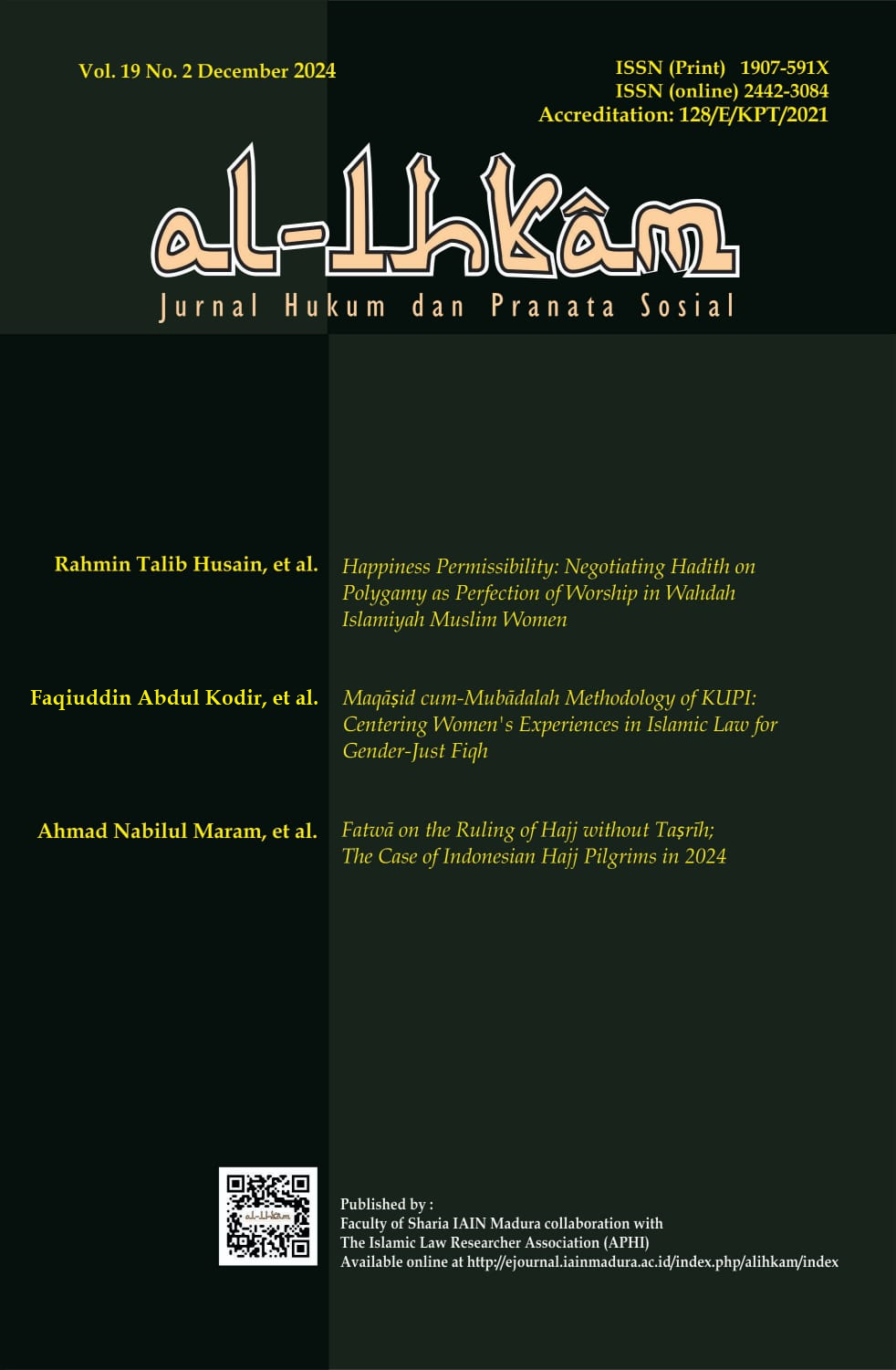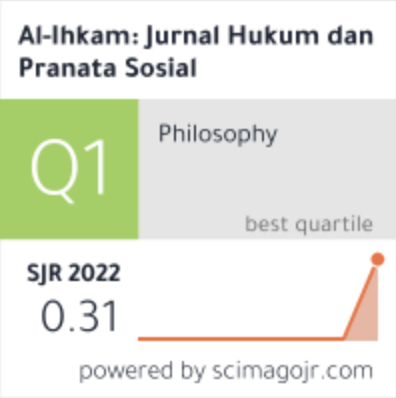Eating Disorders in Islamic Law Perspective: Study of Anorexia, Bulimia and Binge Eating among Muslims
 Abstract views: 490
,
Abstract views: 490
,
 PDF downloads: 312
PDF downloads: 312
Abstract
This study examines the phenomenon of eating disorders, specifically anorexia, and bulimia, from an Islamic legal perspective with two main objectives: first, to identify awareness, familiarity, and experience of eating disorders among Muslims; second, to obtain an interpretation of Islamic law on eating disorders; The research method is qualitative with case study approach, involving six key informants consisting of one patient of anorexia nervosa, one patient of bulimia nervosa, and four patients of binge eating. The results show that awareness of eating disorders among Muslims is still limited, with many individuals and families not fully understanding the medical and psychological nature of these conditions. From an Islamic legal perspective, eating disorders are understood as conditions that require serious attention, in accordance with the principle of maqāṣid syarī’ah which emphasizes the importance of maintaining physical and mental health. However, there is still a lack of specific Islamic legal guidance related to eating disorders. The role of family and religious leaders is very important in providing support but still needs to be improved to reduce stigma and facilitate treatment. In conclusion, eating disorders require a holistic approach, combining professional help, family support, and a faith-based approach to improve the well-being of patients. This study opens up opportunities for further studies involving cross-disciplinary perspectives and focusing on the development of Islamic guidelines related to eating disorders.
Downloads
References
A’anisah, Rinda, and Dini Rahma Bintari. “Welas Asih Diri dan Gejala Gangguan Makan: Infleksibilitas Psikologis Sebagai Mediator.” Psyche 165 Journal 16, no. 4 (2023): 256–63. https://doi.org/10.35134/jpsy165.v16i4.287.
Akgül, Sinem, Orhan Derman, and Nuray Ö Kanbur. “Fasting During Ramadan: A Religious Factor as a Possible Trigger or Exacerbator for Eating Disorders in Adolescents.” International Journal of Eating Disorders 47, no. 8 (2014): 905–10. https://doi.org/https://doi.org/10.1002/eat.22255.
Atikah, Proverawati. Obesitas dan Gangguan Perilaku Makan Pada Remaja. Yogyakarta: Nuha Medika, 2010.
Azizi, Fereidoun. “Islamic Fasting and Health.” Annals of Nutrition and Metabolism 56, no. 4 (2010): 273–82. https://doi.org/10.1159/000295848.
Christensen, Kara A., and Kelsey E. Hagan. “Taking a Bite Out of Eating Disorders: Facts and Myths.” Frontiers for Young Minds 8, no. 1 (2020): 1–8. https://doi.org/10.3389/frym.2020.545034.
Cline, Krista M.C., and Kenneth F. Ferraro. “Does Religion Increase the Prevalence and Incidence of Obesity in Adulthood?” Journal for the Scientific Study of Religion 45, no. 2 (2006): 269–81. https://doi.org/10.1111/j.1468-5906.2006.00305.x.
Estrada, Crystal Amiel M., Marian Fe Theresa C. Lomboy, Ernesto R. Gregorio, Emmy Amalia, Cynthia R. Leynes, Romeo R. Quizon, and Jun Kobayashi. “Religious Education Can Contribute to Adolescent Mental Health in School Settings.” International Journal of Mental Health Systems 13, no. 1 (2019): 1–6. https://doi.org/10.1186/s13033-019-0286-7.
Fayokemi, Adigun Wasilat. “Food Prohibition in Islam: A Step Towards Good Health.” International Journal of Scientific and Research Publications (IJSRP) 10, no. 2 (2020): p9814. https://doi.org/10.29322/ijsrp.10.02.2020.p9814.
Flament, Martine F, Katherine Henderson, Annick Buchholz, Nicole Obeid, Hien N T Nguyen, Meagan Birmingham, and Gary Goldfield. “Weight Status and DSM-5 Diagnoses of Eating Disorders in Adolescents From the Community.” Journal of the American Academy of Child & Adolescent Psychiarty 54, no. 5 (2015): 403–11. https://doi.org/https://doi.org/10.1016/j.jaac.2015.01.020.
Hartati, Hartati, Khoirul Anam, Ahmed Abdul Malik, and Nurul Azizah Dwi Yanti. “Hadith Prohibiting Binge Eating Disorder in Sigmund Freud’s Psychoanalytic Perspective.” Mashdar: Jurnal Studi Al-Qur’an dan Hadis 5, no. 2 (2023): 163–80. https://doi.org/10.15548/mashdar.v5i2.7141.
Hossain, Mohammad Zakir. “What Does Islam Say About Dieting?” Journal of Religion and Health 53, no. 4 (2014): 1003–12. https://doi.org/10.1007/s10943-013-9698-x.
Iftikhar, Rahila, Muhmmad Albar, and Mahdi Qadi. “Obesity and Lifestyle Recommendations in the Light of Islam.” Journal of Family Medicine and Disease Prevention 2, no. 2 (2016): 1–6. https://doi.org/http://dx.doi.org/10.23937/2469-5793/1510034.
Iles, Irina A, Anita Atwell Seate, and Leah Waks. “Stigmatizing the Other: An Exploratory Study of Unintended Consequences of Eating Disorder Public Service Announcements.” Journal of Health Psychology 22, no. 1 (2017): 120–31. https://doi.org/10.1177/1359105315595453.
Latifa, Maysa, Firani Putri, and Charles. “Fenomena Mukbang dalam Perspektif Hadits.” Jurnal El-Rusyd 8, no. 1 (2023): 12–21. https://doi.org/https://doi.org/10.58485/elrusyd.v8i1.142.
Lipson, S K, and K R Sonneville. “Eating Disorder Symptoms among Undergraduate and Graduate Students at 12 U.S. Colleges and Universities.” Eating Behaviors 24 (2017): 81–88. https://doi.org/https://doi.org/10.1016/j.eatbeh.2016.12.003.
M Steefan, Justina, Siddesha G, and Panjugula Madhuri. “Homoeopathic Treatment for Eating Disorders: A Comprehensive Overview and Promising Therapeutic Approach.” International Journal of Science and Healthcare Research 8, no. 3 (2023): 227–35. https://doi.org/10.52403/ijshr.20230333.
Manaf, Nurajirahbt Abdul, Coumaravelou Saravanan, and Beevi Zuhrah. “The Prevalence and Inter-Relationship of Negative Body Image Perception, Depression and Susceptibility to Eating Disorders among Female Medical Undergraduate Students.” Journal of Clinical and Diagnostic Research 10, no. 3 (2016): 1–4. https://doi.org/10.7860/JCDR/2016/16678.7341.
Rustam, Suhartina, Muhammad Sabir, and Abdul Rahman Qayyum. “Bulimia Nervosa Between Islamic Law and Health Perspective.” Al-Risalah Jurnal Ilmu Syariah dan Hukum 20, no. 2 (2020): 136–42. https://doi.org/10.24252/al-risalah.v20i2.19970.
Schaumberg, Katherine, Elisabeth Welch, Lauren Breithaupt, Christopher Hubel, Jessica H. Baker, Melissa A. Munn-Chernoff, Zeynep Yilmaz, et al. “The Science Behind the Academy for Eating Disorders’ Nine Truths About Eating Disorders.” European Eating Disorders Review 25, no. 6 (2017): 432–50. https://doi.org/https://doi.org/10.1002/erv.2553.
Setiawan, Haryansyah. “Tanggapi Fenomena Mukbang, Bagaimana Konsumsi dalam Islam.” Universitas Airlangga, January 16, 2023. https://unair.ac.id/tanggapi-fenomena-mukbang-bagaimana-konsumsi-dalam-islam/.
Sulistyo Andarmoyo, Harmy bin Mohamed Yusoff, Berhanudin bin Abdullah, Yuzana bint Mohd Yusop. “Islamic Spiritual Guidelines (An Alternative Model to Improve Treatment Compliance with Type 2 Diabetes Mellitus Patients).” Jurnal Medika Hutama 1, no. January (2020): 56–62. http://eprints.umpo.ac.id/id/eprint/5214.
Tavolacci, Marie-Pierre, Pierre Déchelotte, and Joel Ladner. “Eating Disorders among College Students in France: Characteristics, Help-and Care-Seeking.” International Journal of Environmental Research and Public Health 17, no. 5914 (2020): 1–11. https://doi.org/https://doi.org/10.3390/ijerph17165914.
Umi Suryana, Elda, Wulandari, and Ahmad Soleh Sakni. “Gangguan Makan Anorexia Nervosa dan Bulimia Nervosa Pada Remaja Putri.” The Ushuluddin International Student Conference 1, no. 2 (2023): 706–16. https://proceedings.radenfatah.ac.id/index.php/UInScof2022/article/view/954.
Wassenaar, Elizabeth, Julie Friedman, and Philip S Mehler. “Medical Complications of Binge Eating Disorder.” Psychiatric Clinics 42, no. 2 (June 1, 2019): 275–86. https://doi.org/10.1016/j.psc.2019.01.010.
Westmoreland, Patricia, Mori J. Krantz, and Philip S. Mehler. “Medical Complications of Anorexia Nervosa and Bulimia.” American Journal of Medicine 129, no. 1 (2016): 30–37. https://doi.org/10.1016/j.amjmed.2015.06.031.
Yu, Zhiping, and Valerie Muehleman. “Eating Disorders and Metabolic Diseases.” International Journal of Environmental Research and Public Health 20, no. 3 (2023). https://doi.org/10.3390/ijerph20032446.
Yusuf, Nasruddin, Suprijati Sarib, Evra Willya, and Rosdalina Bukido. “The Difficulty of Finding Halal Food for Muslim Minorities: Analysis of Maqasid Sharia.” Al-Istinbath: Jurnal Hukum Islam 8, no. 2 (2023): 325–46. https://doi.org/10.29240/jhi.v8i2.8182.
Copyright (c) 2025 AL-IHKAM: Jurnal Hukum & Pranata Sosial

This work is licensed under a Creative Commons Attribution-ShareAlike 4.0 International License.
In order to be accepted and published by Al-Ihkam: Jurnal Hukum dan Pranata Sosial, author(s) submitting the article manuscript should complete all the review stages. By submitting the manuscript, the author(s) agreed to the following terms:
- The copyright of received articles shall be assigned to Al-Ihkam: Jurnal Hukum dan Pranata Sosial as the publisher of the journal. The intended copyright includes the right to publish articles in various forms (including reprints). Al-Ihkam: Jurnal Hukum dan Pranata Sosial maintain the publishing rights to the published articles.
- Authors are permitted to disseminate published articles by sharing the link/DOI of the article at Al-Ihkam: Jurnal Hukum dan Pranata Sosial. Authors are allowed to use their articles for any legal purposes deemed necessary without written permission from Al-Ihkam: Jurnal Hukum dan Pranata Sosial with an acknowledgment of initial publication to this journal.
- Users/public use of this website will be licensed to CC-BY-SA.



.png)
_1.png)










